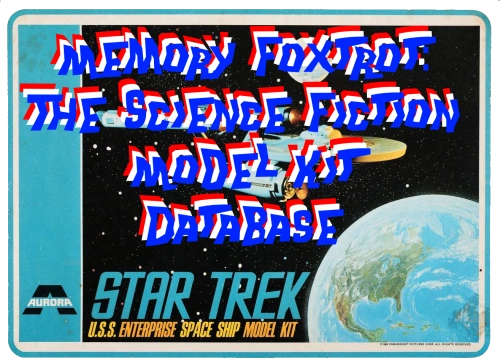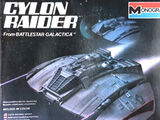Monogram is an American manufacturer of scale plastic models of aircraft, spacecraft, ships, cars, and military vehicles since the early 1950s. The company was formed by two former employees of Comet Kits, Jack Besser and Bob Reder. After thirteen years as a fully owned subsidiary of Hallmark Cards' Binney and Smith unit, Hobbico announced it was acquiring Revell-Monogram in 2007 (Funding Universe webpage). Along with Revell, AMT, and MPC, Monogram is sometimes called one of the traditional "Big 4" in plastic modeling (Gosson 2015, p. 67).
Origins[]
Monogram was founded in Chicago in 1945, making balsa wood model kits of ships and airplanes. Seaships such as the USS Missouri battleship, the USS Shangri-La carrier and the USS Hobby destroyer were among the very first products. Meanwhile, a company called Revell started making plastic kits in 1953, and Monogram responded with "All Plastic" "Plastikits" the first of which were a red plastic midget racer and a "Hot Rod" Model A - and the modeling race was on (Funding Universe webpage). These two cars, and later an Indianapolis-style racer and hydroplane racing boat, were also offered with C02 "Jet Power". Early kits advertised that the models were made from "acetate parts molded to shape". The wording showed the newness of the plastics industry and how plastics were not yet being taken for granted.
Early airplane models were mainly balsa wood, but more plastic parts were added over the next couple of years. By 1954 the airplane lineup consisted of the 'Speedee Built' series which flew under rubber band power. A few of these planes were all-plastic. Also seen were the Superkits with a prefabricated balsa fuselage, but more plastic parts.
Auto kit makers AMT and Jo-Han started early but focused on manufacturers' promotional models and did not enter the kit fray until the late 1950s. As the 1950s progressed, Monogram increasingly included more automobile models and custom wheeled creations in competition with the other makers. Through the 1970s, competition required increased production of a variety of fantastical vehicles.
Many Changes of Hands[]
In 1984 Mattel divested itself of many companies not associated with its traditional toy industries (Funding Universe website). In 1986, Monogram was bought by Odyssey Partners of New York. Later that same summer, Odyssey purchased [[:>Category:Revell|Revell]] Models of Venice, California. Subsequently, Odyssey Partners merged Revell with Monogram and moved all its usable assets to Monogram's Des Plaines, Illinois Plant Number 2. After Revell was merged with Monogram, company headquarters was moved a short distance to Northbrook, Illinois.
In the early 1990s, Revell-Monogram embarked on an experiment that tried to match historic modeling logos with a CD-Rom racing car game. After investing nearly $4 million, customers had trouble distinguishing model from game and the project was scrapped after only 50,000 were sold (Wallace 1994). Also in the early 1990s, Monogram sold their 1/87 Mini Exacts HO series to Herpa, where some of the models continue to be sold even today. One difference from the normal Herpa models was a metal chassis.
In 1994 Revell-Monogram was purchased by Hallmark Cards as part of its Binney and Smith division (the owners of famous Crayola crayons). This relationship lasted for thirteen years.
In May 2007, Hobbico Inc., the radio control airplane maker, announced the acquisition of Revell-Monogram LLC. From 1987 to 2005 the Monogram logo had appeared underneath that of Revell, but since the Hobbico acquisition, the Monogram name has disappeared. Now the Revell logo stands alone as Hobbico renamed the subsidiary the Revell Group, which consists of both revered names (the Revell-Monogram webpage has a graphic progression of the development of the two companies' logos going back to 1945 - see Revell-Monogram 1996-2011). Concerning plastic kits, Hobbico also owns Estes, and is the exclusive distributor of Hasegawa, as seen on their company websites.
Hobbico declared bankruptcy on June 30, 2018 and went into liquidation (Zigterman 2018). Companies linked to production/sale of model kits.
All items (7)








